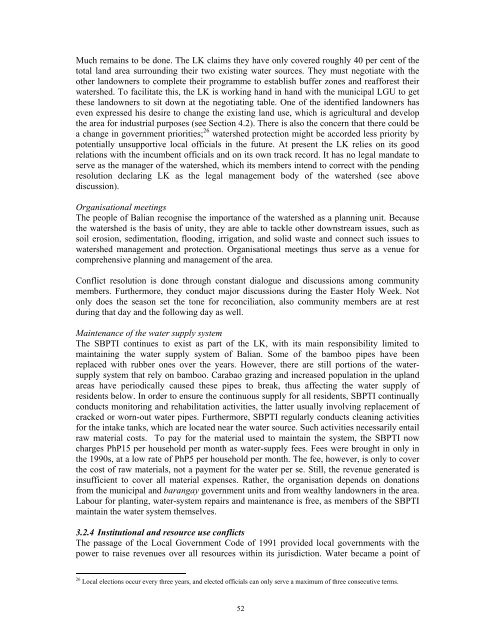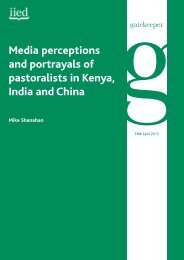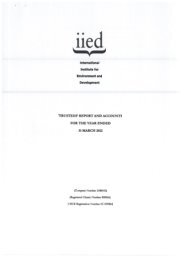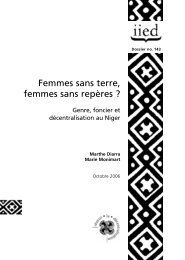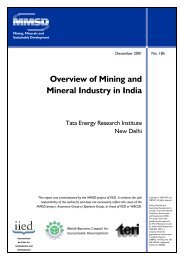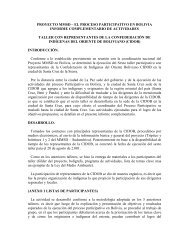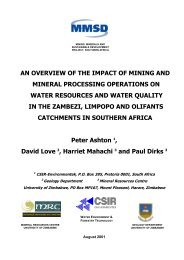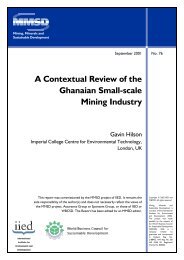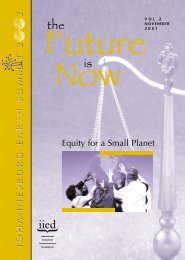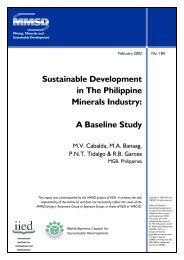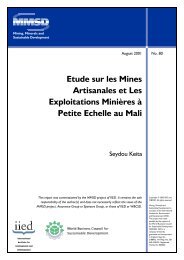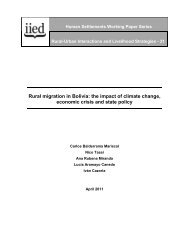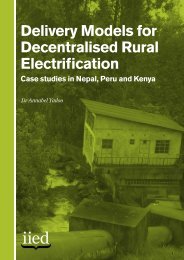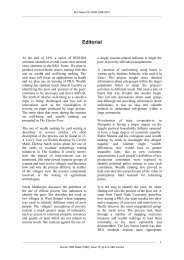Developing pro-poor markets for environmental services in the ...
Developing pro-poor markets for environmental services in the ...
Developing pro-poor markets for environmental services in the ...
Create successful ePaper yourself
Turn your PDF publications into a flip-book with our unique Google optimized e-Paper software.
Much rema<strong>in</strong>s to be done. The LK claims <strong>the</strong>y have only covered roughly 40 per cent of <strong>the</strong><br />
total land area surround<strong>in</strong>g <strong>the</strong>ir two exist<strong>in</strong>g water sources. They must negotiate with <strong>the</strong><br />
o<strong>the</strong>r landowners to complete <strong>the</strong>ir <strong>pro</strong>gramme to establish buffer zones and reaf<strong>for</strong>est <strong>the</strong>ir<br />
watershed. To facilitate this, <strong>the</strong> LK is work<strong>in</strong>g hand <strong>in</strong> hand with <strong>the</strong> municipal LGU to get<br />
<strong>the</strong>se landowners to sit down at <strong>the</strong> negotiat<strong>in</strong>g table. One of <strong>the</strong> identified landowners has<br />
even expressed his desire to change <strong>the</strong> exist<strong>in</strong>g land use, which is agricultural and develop<br />
<strong>the</strong> area <strong>for</strong> <strong>in</strong>dustrial purposes (see Section 4.2). There is also <strong>the</strong> concern that <strong>the</strong>re could be<br />
a change <strong>in</strong> government priorities; 26 watershed <strong>pro</strong>tection might be accorded less priority by<br />
potentially unsupportive local officials <strong>in</strong> <strong>the</strong> future. At present <strong>the</strong> LK relies on its good<br />
relations with <strong>the</strong> <strong>in</strong>cumbent officials and on its own track record. It has no legal mandate to<br />
serve as <strong>the</strong> manager of <strong>the</strong> watershed, which its members <strong>in</strong>tend to correct with <strong>the</strong> pend<strong>in</strong>g<br />
resolution declar<strong>in</strong>g LK as <strong>the</strong> legal management body of <strong>the</strong> watershed (see above<br />
discussion).<br />
Organisational meet<strong>in</strong>gs<br />
The people of Balian recognise <strong>the</strong> importance of <strong>the</strong> watershed as a plann<strong>in</strong>g unit. Because<br />
<strong>the</strong> watershed is <strong>the</strong> basis of unity, <strong>the</strong>y are able to tackle o<strong>the</strong>r downstream issues, such as<br />
soil erosion, sedimentation, flood<strong>in</strong>g, irrigation, and solid waste and connect such issues to<br />
watershed management and <strong>pro</strong>tection. Organisational meet<strong>in</strong>gs thus serve as a venue <strong>for</strong><br />
comprehensive plann<strong>in</strong>g and management of <strong>the</strong> area.<br />
Conflict resolution is done through constant dialogue and discussions among community<br />
members. Fur<strong>the</strong>rmore, <strong>the</strong>y conduct major discussions dur<strong>in</strong>g <strong>the</strong> Easter Holy Week. Not<br />
only does <strong>the</strong> season set <strong>the</strong> tone <strong>for</strong> reconciliation, also community members are at rest<br />
dur<strong>in</strong>g that day and <strong>the</strong> follow<strong>in</strong>g day as well.<br />
Ma<strong>in</strong>tenance of <strong>the</strong> water supply system<br />
The SBPTI cont<strong>in</strong>ues to exist as part of <strong>the</strong> LK, with its ma<strong>in</strong> responsibility limited to<br />
ma<strong>in</strong>ta<strong>in</strong><strong>in</strong>g <strong>the</strong> water supply system of Balian. Some of <strong>the</strong> bamboo pipes have been<br />
replaced with rubber ones over <strong>the</strong> years. However, <strong>the</strong>re are still portions of <strong>the</strong> watersupply<br />
system that rely on bamboo. Carabao graz<strong>in</strong>g and <strong>in</strong>creased population <strong>in</strong> <strong>the</strong> upland<br />
areas have periodically caused <strong>the</strong>se pipes to break, thus affect<strong>in</strong>g <strong>the</strong> water supply of<br />
residents below. In order to ensure <strong>the</strong> cont<strong>in</strong>uous supply <strong>for</strong> all residents, SBPTI cont<strong>in</strong>ually<br />
conducts monitor<strong>in</strong>g and rehabilitation activities, <strong>the</strong> latter usually <strong>in</strong>volv<strong>in</strong>g replacement of<br />
cracked or worn-out water pipes. Fur<strong>the</strong>rmore, SBPTI regularly conducts clean<strong>in</strong>g activities<br />
<strong>for</strong> <strong>the</strong> <strong>in</strong>take tanks, which are located near <strong>the</strong> water source. Such activities necessarily entail<br />
raw material costs. To pay <strong>for</strong> <strong>the</strong> material used to ma<strong>in</strong>ta<strong>in</strong> <strong>the</strong> system, <strong>the</strong> SBPTI now<br />
charges PhP15 per household per month as water-supply fees. Fees were brought <strong>in</strong> only <strong>in</strong><br />
<strong>the</strong> 1990s, at a low rate of PhP5 per household per month. The fee, however, is only to cover<br />
<strong>the</strong> cost of raw materials, not a payment <strong>for</strong> <strong>the</strong> water per se. Still, <strong>the</strong> revenue generated is<br />
<strong>in</strong>sufficient to cover all material expenses. Ra<strong>the</strong>r, <strong>the</strong> organisation depends on donations<br />
from <strong>the</strong> municipal and barangay government units and from wealthy landowners <strong>in</strong> <strong>the</strong> area.<br />
Labour <strong>for</strong> plant<strong>in</strong>g, water-system repairs and ma<strong>in</strong>tenance is free, as members of <strong>the</strong> SBPTI<br />
ma<strong>in</strong>ta<strong>in</strong> <strong>the</strong> water system <strong>the</strong>mselves.<br />
3.2.4 Institutional and resource use conflicts<br />
The passage of <strong>the</strong> Local Government Code of 1991 <strong>pro</strong>vided local governments with <strong>the</strong><br />
power to raise revenues over all resources with<strong>in</strong> its jurisdiction. Water became a po<strong>in</strong>t of<br />
26 Local elections occur every three years, and elected officials can only serve a maximum of three consecutive terms.<br />
52


